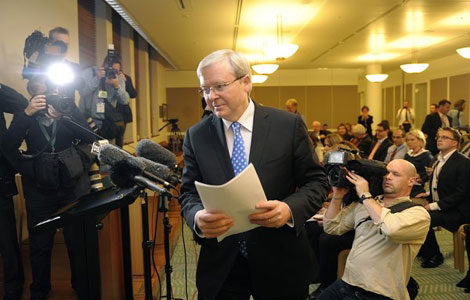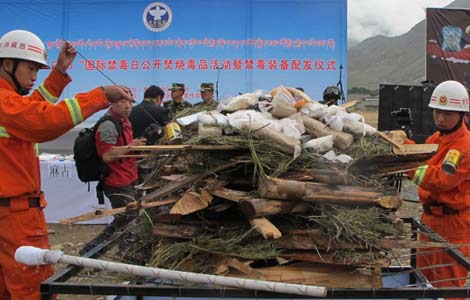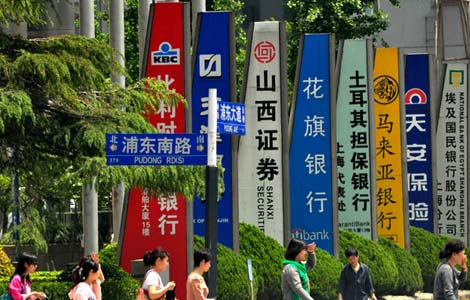Tougher punishments for polluters proposed
Updated: 2013-06-27 06:47
By Zhao Yinan (China Daily)
|
||||||||


Draft may be better deterrent, but environmental NGOs unhappy
The draft amendment to the Environmental Protection Law has proposed the strictest-ever punishment for polluting companies in China.
Companies that illegally dump sewage and fail to modify their discharge and emission systems to meet the required standard are subject to fines based on a consecutive daily rate, according to the draft amendment to the Environmental Protection Law.
The draft was proposed for a second reading on Wednesday.
If passed, it would introduce the toughest penalties ever imposed on polluting companies. Current regulations on illegal dumping and emissions generally have a ceiling on penalties. For instance, the country's Law on Prevention and Control of Air Pollution stipulates that polluters are subject to a one-time penalty of up to 200,000 yuan ($32,540).
Environmental protection law requires companies to discharge sewage according to an amount approved by the government, but the financial penalties against those that fail to meet the standard have long been criticized because they don't deter businesses from polluting.
Cao Mingde, an environmental law professor at China University of Political Science and Law, said the draft, which allows the financial penalty to accumulate at a daily rate, will motivate polluters to improve their discharge and purification systems in a timely manner.
According to the draft, companies and other organizations that intentionally escape supervision and discharge excessive pollutants may be prosecuted. Those whose activities are not serious enough for criminal prosecution will be punished according to the law on penalties for administration of public security, for instance being put under administrative detention.
Besides harsher punishment, the draft introduces measures to encourage law-abiding and environmentally friendly enterprises. The government is urged to offer preferential policies in tax and loans to enterprises that have a good record in reducing pollution and protecting the environment.
The proposed regulation on tax and loans is accompanied by a government policy that the State Council issued earlier this month, which says that loans should not be made to projects that haven't passed the environmental assessment, and no electricity or water should be offered to such projects.
Despite its efforts to enhance the penalty for illegal dumping, Wednesday's draft has sparked wide speculation that it may hinder the public's participation in protecting their interests by filing a lawsuit.
The draft proposes authorizing the All-China Environment Federation and its provincial branches to initiate class-action lawsuits against polluters on behalf of the public.
If the draft is passed, the organization, affiliated with the government, will become the only entity in China allowed to file a class-action lawsuit regarding environmental pollution.
Li Gang, a lawyer specializing in environmental litigation, said the draft has effectively deprived other social groups of their litigation rights.
Li said the number of environment-related cases has been increasing at more than 5 percent annually, and it is unreasonable to limit the litigants to only one organization.
The Civil Procedure Law, China's essential procedure code to deal with civil disputes, stipulates that government agencies and organizations approved by law are allowed to file class-action lawsuits, in which a group of people collectively bring litigation concerning environmental pollution and unsafe food incidents to court to defend the public interest.
Friends of Nature, an environmental NGO, is filing a class-action lawsuit in Yunnan province, where contaminating chromium was dumped, polluting water resources.
"The draft amendment (on class-action lawsuits against polluters) will significantly dampen public interest in the environment," said Yang Cheng, a project officer from Friends of Nature who is in charge of the Yunnan lawsuit.
The NGO submitted an open letter to the National People's Congress Standing Committee, the top legislature, on Wednesday, saying that the draft amendment will be difficult to enforce.
"We strongly suggest the NPC Standing Committee revise the stipulation," it said.
The attempt to amend the environmental protection law was considered an important part of the country's comprehensive effort to conserve resources and curb pollution.
The law has not been revised since it took effect in 1989. However, over the past two decades, the country has faced worsening pollution problems and the public has become less tolerant of environmental hazards.
Multiple Chinese cities were choked by dense smog earlier this year. Beijing's average PM2.5 density in January was 180 micrograms per cubic meter, about 30 percent higher than the level during the same period in 2011, according to meteorological data.
The Ministry of Environmental Protection said that 10 million hectares of farmland, or 8.3 percent of arable land in the country, is polluted, particularly near the middle and lower reaches of the Yangtze River. Experts said that has led to a string of food safety scandals caused by soil pollution.
Earlier this month, China's Supreme People's Court and Supreme People's Procuratorate jointly issued a new judicial interpretation, imposing harsher punishments on polluters.
The bylaw also lowered the threshold of activities that constitute a crime and offers more precise criteria for convictions and sentencing for judges.
Xinhua contributed to this story.
zhaoyinan@chinadaily.com.cn
(China Daily USA 06/27/2013 page4)

 Philippine, US start Naval exercise in S China Sea
Philippine, US start Naval exercise in S China Sea
 Supreme Court gay rights ruling celebrated across US
Supreme Court gay rights ruling celebrated across US
 Rudd returns as Australian PM after Gillard
Rudd returns as Australian PM after Gillard
 Brazil protests intensify before Confed Cup semifinal
Brazil protests intensify before Confed Cup semifinal
 Long lost weekend
Long lost weekend
 Park ready to charm China
Park ready to charm China
 Prices climb as police crack down
Prices climb as police crack down
 China 'most promising' in FDI
China 'most promising' in FDI
Most Viewed
Editor's Picks

|

|

|

|

|

|
Today's Top News
Promising outlook on US, China investment
IBM to make Chinese job cuts
PBOC ends credit crunch, to go further
Snowden still at Moscow's airport, asylum pending
Mandela still critical, Zuma cancels trip
China slams Japan's new defense white paper
US Treasury Under Secretary to visit China
Door opens on better homes for poor
US Weekly

|

|







